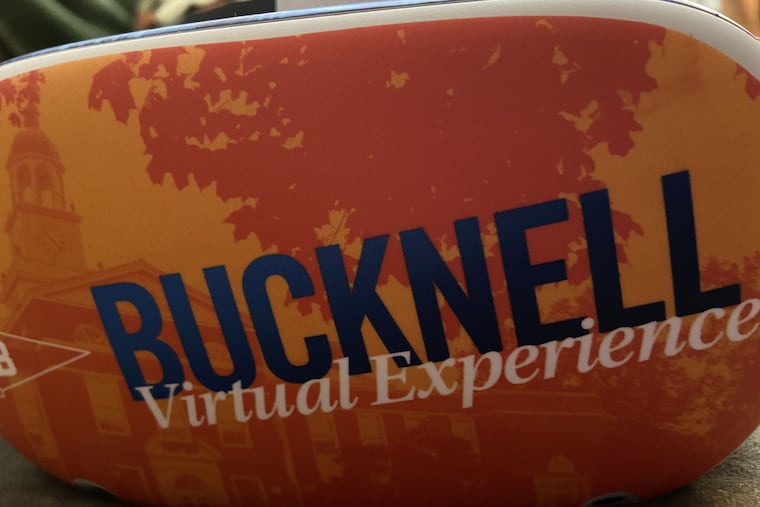Bucknell tries a new approach to the campus visit: A customized virtual reality experience
Users feel as if they are walking through the iron gates outside the campus’ Memorial Stadium. They can stand mid-court at a basketball game or walk into a dorm room, classroom, or library.

Even before the pandemic, Bucknell University had been looking for a way to show students what its central Pennsylvania campus is like, without their having to visit.
The pandemic made the quest more urgent, as many schools were forced to shut down on-campus tours or restrict access to buildings. In a pilot program this spring, Bucknell, with the help of a Chicago-based digital agency, loaded its new virtual reality experience onto Oculus headsets.
Users feel as if they are walking through the iron gates outside the campus’ Memorial Stadium, a momentous pass-through, considering it’s where Bucknell students walk as freshmen during convocation and again as seniors during commencement. Once inside, users can stand midcourt at a basketball game as players warm up around them, step inside a dorm room where students on a bunk bed converse, enter classrooms, the performing arts center, and the library, and even appear to stroll on Main Street Lewisburg, home to Bucknell.
» READ MORE: With testing requirements relaxed, applications soar at selective colleges
“While we certainly hope this project carries us forward well beyond the pandemic, there seemed like no better time to think about creative ways to introduce campus life to students,” said Lisa Keegan, vice president for enrollment management.
While many schools have created online virtual tours, Bucknell appears to be among the first to offer such a customized experience in virtual reality that allows viewers to walk around campus spaces without leaving their living rooms.
“I don’t know of any other college that has this kind of immersive Oculus-based virtual experience,” said David Hawkins, chief education and policy officer for the National Association of College Admission Counseling. ”They may be pioneers in that regard.”
It could catch on, depending upon how widely available the technology becomes, he said.
» READ MORE: As colleges compete for fewer students, the pressure rises to meet enrollment targets
After COVID-19 hit, colleges around the country scrambled to create virtual tours and other experiences for prospective students. Some even did it before the pandemic. The University of Pennsylvania in February 2020 unveiled its virtual online tour, which users can view on Penn’s website, or by using YouVisit, a company that helps colleges create immersive virtual experiences.
Princeton also has a virtual tour, using technology developed by a student-led start-up company.
Bucknell pursued its project as a result of a donor gift from 1993 alumnus Marc Lore, formerly the president and CEO of Walmart U.S. e-Commerce.
“I’ll never forget stepping foot on the Bucknell University campus for the first time — the big trees, brick buildings, and surrounding town of Lewisburg — there was something so peaceful about it,” Lore said in a LinkedIn post. “What if you could capture all that makes #Bucknell special, bring it to life with #VR, and make it available to anyone, anywhere?”
The virtual tour leads viewers to a B-shaped courtyard that actually doesn’t exist. From there, viewers choose each campus space they want to enter by clicking on an orb. The virtual experiences were created using 360-degree videos and photos; when the pandemic ends, more material will be filmed and added, Keegan said.
The university has 17 headsets. It offers some to visitors in its admissions center and has begun mailing some to prospective students who haven’t been able to get to campus or weren’t able to get inside some spaces. Students then are expected to mail the sets back in enclosed packaging.
“All my friends came over. They loved it,” said Siena Abercrombie, a high school senior from Pittsburgh who received an Oculus set.
Abercrombie, 18, active in theater and dance and in the top 20% of her senior class, visited Bucknell in April but couldn’t see inside a dorm room or classrooms because of pandemic restrictions. The Oculus set arrived in the mail a couple of weeks later, giving her that glimpse. She plans to attend Bucknell in the fall.
Bucknell hopes to offer full on-campus tours this summer as the pandemic ebbs, but even post-pandemic, the university sees uses for the technology, Keegan said. Admissions officers who recruit internationally will be able to take headsets with them, and students who lack financial resources or otherwise can’t get to campus could receive a set in the mail, Keegan said.
Bucknell also foresees using the technology to get younger students, already excited about gaming, interested in college, she said. Bucknell’s virtual experience also is available via a web browser.
Admissions officials at other schools have heard about Bucknell’s Oculus tour.
“It’s really cool,” said Jess Lord, vice president and dean of admission and financial aid at Haverford College. “It’s like the deluxe version of what we’re all doing.”
The difficulty could be cost, he said. Oculus headsets cost a few hundred dollars and there’s the cost of developing the experience. Bucknell wouldn’t release the size of Lore’s gift or the cost.
“The reality is that the technology is not cheap — and frankly, I question whether there is a good return on investment,” said Shawn L. Abbott, Temple University’s vice provost for admissions, financial aid, and enrollment management. “… There comes a point where nothing can quite replace the experience of actually visiting a college campus.”
He said 67% of admitted students who visited Temple between March 15 and May 1 enrolled.
Another drawback, Hawkins of the national admission group said, is that a virtual experience offers what a college wants applicants to see. An actual tour reveals “warts and all,” he said.